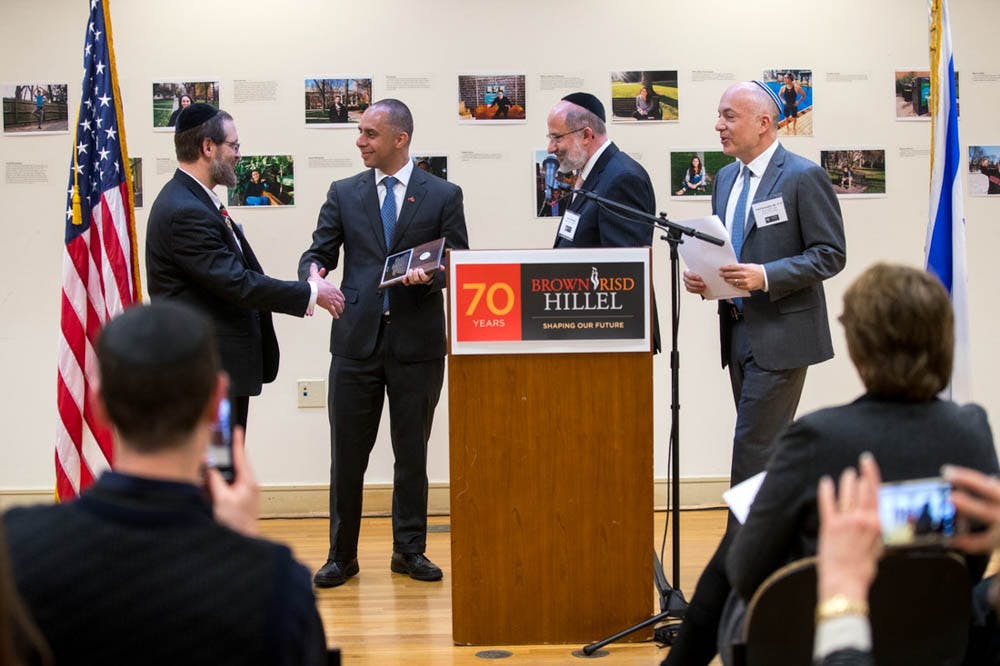Providence’s eruv — a symbolic bounded area that allows Orthodox Jews to do tasks they are usually barred from on the Sabbath, like carrying items — was extended to include the Brown and RISD campuses Apr. 4. The decision reflects a commitment to “Jews for whom Jewish law is central,” such as those from orthodox and conservative denominations, said University Rabbi Michelle Dardashti.
Carrying items in public is one of the 39 prohibited activities during the Sabbath, Dardashti said. The prohibition on carrying extends not only to items such as bags and keys but also to carrying children and using canes, she said.
Currently a minority of the Jewish community at Brown and RISD strictly adhere to the restriction on carrying items during the Sabbath, said Brown/RISD Hillel Executive Director Marshall Einhorn. The absence of an eruv “represented a significant barrier” for observant students and community members over the years, he said, adding that parents of potential students have contacted him to ask whether Brown was bounded by an eruv. The extension of the eruv is “an important way that we continue to make Brown and RISD schools where Jewish students of all practices feel welcomed,” Einhorn said. Now that the eruv has been extended to College Hill, “future students, faculty (members) and community members” who follow the prohibition “may be able to put Brown and RISD on the list of schools they would consider,” he added.
Brown is now the seventh school in the Ivy League to be bounded by an eruv — Dartmouth is now the only Ivy League school that is not included within an eruv’s borders, Marshall said.
The Apr. 4 eruv dedication ceremony was attended by President Christina Paxson P’19 and Mayor Jorge Elorza. The extension “couldn’t have been done without the city’s support and help,” said Hillel Trustee David London ’64. In accordance with Jewish law, a plaque with a silver dollar — a coin of value — was given to the mayor in exchange for the right of observant Jews to carry items on the Sabbath, London said.
The Providence Eruv was originally established 30 years ago to cover most of the East Side of Providence and adjacent areas in Pawtucket. There had been discussions on and off at Hillel about its extension, but efforts to extend the existing eruv began four years ago with a discussion with the Providence Eruv Corporation, Einhorn said. The eruv was extended according to Jewish law, and its borders are physically marked by a thin wire strung between telephone and electric poles, with the Providence River serving as the western border.
London helped lead the extension efforts, which involved coordinating with Brown and RISD staff members, local officials and a telecommunication company to use their poles. London worked with Paxson, University Chaplain Janet Cooper Nelson, Assistant Vice President of Real Estate John Luipold, the Office of Student Life and the RISD facilities department. Sam Zurier, city councilman of the College Hill council district, helped London connect with the Property Department, Solicitors Office and Public Works department, among other groups.
London, who does not observe the carrying prohibition, said he wished “to broaden the appeal of Brown and RISD as (places where) anyone who’s Jewish, regardless of their level of observance, would feel comfortable coming.”
Before the eruv was extended to Brown, Dardashti, who has three small children, was unable to keep this prohibition during the Sabbath. For this reason, the extension is both personally and professionally exciting, she said.
Vice President for Social Engagement at Hillel Shoshana Rosenzweig ’19 went to Salanter Akiba Riverdale High School in New York City, a modern orthodox Jewish school where “a lot of students wouldn’t even consider Brown because (there was no eruv). So now it opens the possibility to a lot more observant Jews coming to Brown.”
“In terms of getting more diversity in Brown’s Jewish community, I think it’s a really important step. (Because) our community is largely nonorthodox,” said Hillel Shabbat Committee Chair Akiva Chaleff ’20. “There’s very, very few of us who are observant of (the carrying prohibition) simply because” people who are would not have previously chosen to come to Brown as it did not support “that kind of religious lifestyle,” Chaleff said.
Before the eruv was extended, on Sabbath or holidays with Sabbath restrictions, Chaleff wore his keys on a necklace, as using a keychain “would have constituted moving them from place to place.” The day before the Sabbath, Chaleff would put all the items he needed for the day, such as his books and his epipen, in Hillel. After the eruv extension, “I’ve been able to sit outside and read. And just having the ability to make (fewer) preparations. … I’m just a lot more mobile. … I can take a walk and bring a water bottle with me on Jewish holidays. It’s honestly fantastic,” Chaleff said.
Correction: A previous version of this article misspelled the last name of councilman Sam Zurier. Has last name is "Zurier," not "Zuridr." The Herald regrets the error.





